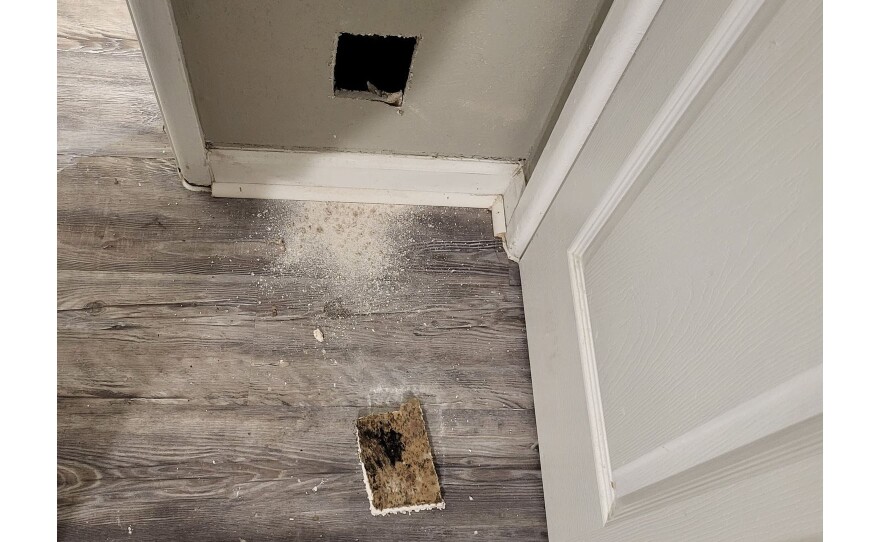When Beth Peacock lived at Emery Gardens apartments last year, she said she found mold everywhere.
In her shower. Lining the hallways. She even cut out a piece of drywall to see whether mold lined the backside of it. It did.
The problem, she said, was not just aesthetic. Peacock said she and her nine-year-old son started having difficulty breathing.
“My own mother actually had threatened to contact Child Protective Services on me if I didn't get my children out of that situation,” she said.
Peacock said she had called the property manager repeatedly about the issue. Because that wasn’t working, she eventually called the city’s inspections department.
But she discovered that Wichita doesn’t have any housing codes regulating mold.
“I felt really defeated,” Peacock said.
Health officials say mold can cause major respiratory issues, especially in vulnerable populations like youth and the elderly. But many cities – including Wichita – don’t address it in city housing codes. Kansas’ landlord-tenant act does not specifically name mold as a habitability problem, and federal air quality regulations do not address mold.
Some tenants say they would like to see that change.
“It’s crazy," said Sarah Hegi, another tenant at Emery Gardens. "It’s ridiculous because people can get really sick from the mold."
But some landlords disagree that mold should be regulated, saying mold can be caused by the tenant – and such regulations would make housing more expensive.
Emery Gardens did not return multiple calls for comment. Emails to the address listed on the apartment’s website went undelivered.
Peacock’s story
Peacock said she moved into the three-bedroom apartment in Emery Gardens near Hydraulic and MacArthur in January 2022. Rent was $875 a month.

She said she noticed the mold soon after moving in. That spring, she and her husband started reporting concerns about water leaks and mold to property management, both in person and through the apartment’s messaging system.
Peacock said the apartment painted over the mold with a mold blocking primer. But she worried that didn’t solve the root of the problem because she continued to notice water leaks.
Meanwhile, Peacock said she was beginning to have health issues. In May, she went to the doctor because she was struggling to breathe.
The next day, her breathing troubles persisted. She says she went to the emergency room and ended up on a ventilator for over a week.

“They tested my lungs, and they said I have mold particles in my lungs,” Peacock said.
Mold is naturally occurring and grows in moist environments. Stephen Arnold, a professor of environmental health at Wichita State University, said that people’s immune systems can fight off mold in small quantities. But when it becomes concentrated, especially indoors, people inhale more mold spores and are at higher risk of developing a fungal lung infection that's much worse than a cold.
“(It’s) much deeper in the lung, much more severe,” Arnold said. “It can very easily cause hospitalization – especially in those who are predisposed to already being at risk because of age or other respiratory conditions.”
Hegi also lives at Emery Gardens, though in a different building. Two vacant units beneath hers have mold up and down the walls, she said. Since moving in, she said her three kids are constantly battling sore throats and sinus issues.
“My oldest daughter was tested for the flu, COVID, strep, mono,” Hegi said. “And everything’s kept coming back negative.”
Back from the hospital
After returning home in early June, Peacock continued to alert the apartment complex to the mold. She said she also called the city to have her apartment inspected.

But she said an inspector told her that without a mold ordinance, the city couldn't do anything about it.
Unlike rodents or insects, the city doesn’t mention mold in its housing code.
What the city can do is cite the landlord if there’s a leak causing the mold, said Kalyn Nethercot, the Neighborhood Inspection Administrator for the Metropolitan Area Building and Construction Department.
“What we’re going to do is try to figure out what’s the source of that water,” Nethercot said. “Once that problem is eliminated, mold has nothing to grow on.”
But Arnold, the WSU professor, said it can be difficult to locate the source of mold – for example, if it’s in the middle of a complex ventilation system or in another apartment.
Kansas’ landlord-tenant law doesn’t mention mold, but it says every landlord has to meet the city’s building and housing codes. Steve Minson, a lawyer with Kansas Legal Services, said tenants could attempt to make the argument in court that mold is a health and safety violation – it would just be a difficult case.
“The landlord’s going to say, ‘This isn’t even regulated,’ ” Minson said. “ ‘The city of Wichita doesn’t even think this is a housing code problem, so what are you suing me for?’ ”
Some states have moved to regulate mold more explicitly. Colorado’s legislature passed a bill in 2019 that added mold associated with dampness to habitability standards landlords have to abide by.
The legislation means that tenants with mold now have a legal avenue to end their lease, withhold rent or ask their landlord to remediate the mold, said Jack Regenbogen, an attorney with Colorado Poverty Law Project.
“One of the main benefits of the 2019 legislation is it explicitly did add mold to the list of conditions a landlord is responsible for addressing in order to maintain healthy and safe housing,” Regenbogen said.
But he said the law was not a silver bullet. Many tenants need to hire lawyers to withhold rent properly or to go to court, an expense most can’t afford.
Not everyone agrees that mold should be explicitly addressed in housing code or state statute. Kevin Kimmell, vice president of the Association of Kansas Landlords, said mold shouldn’t be regulated because it’s a naturally occurring substance, and its growth can be caused by tenant’s actions.
He said a better solution is tenants initiating conversations with the property managers and building owners.
“Every time we find a problem and start creating a law that addresses that problem, it increases the cost of housing for everyone,” Kimmell said. “And that means more and more people are falling off the rung of being housed or being homeless.”
Kimmell added that, if a landlord continually fails to meet maintenance or contract agreements, tenants can always give a 14/30 notice — a written notice where tenants state they will leave in 30 days if the landlord doesn't begin certain repairs or maintenance in 14 days.
The sickness spreads
As summer wore on last year, Peacock’s messages to Emery Gardens grew more insistent.

“Mold is growing even more and my family is getting sick,” Peacock wrote to Emery Gardens on July 18th, 2022 . “We cannot continue to live in this poor living condition.”
The message proved prescient: Peacock said her son ended up in the hospital several days after that. She thought he was having an asthma attack, but his inhaler didn’t help. They called 911.
When they got to the hospital, Peacock said she told medical staff about the mold.
“I was afraid I was going to lose my kid right then at the hospital to the state,” Peacock said. “Because they sent a social worker up there to talk to us about the mold and everything.”
Peacock said she finally decided to cut a square out of the drywall to show maintenance staff that it needed more intensive treatment than paint.
It revealed what she suspected: mold layered on the back of her wall.
She said the apartment complex finally took the problem seriously, tearing up her wall. The complex moved her family into a hotel in late July of last year.
Peacock said her family stayed in the hotel for several weeks, where they had to rack up extra expenses – eating out, paying extra for their dog to stay with them. When they returned, Peacock said her family was put into a different unit, with a long list of its own maintenance issues.
“My kids had no allergy issues whatsoever when we were in the hotel,” Peacock told a property manager when she returned, a conversation she captured in a recording. “Now, I have a kid that was in the emergency room last night. There’s something wrong with these apartments.”
Her family left Emery Gardens that fall, unable and unwilling to put up with the situation any longer.
“I am just fed up,” Peacock told the property manager.







